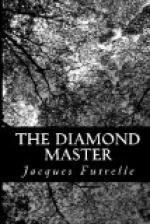“He has—what?” asked Mr. Latham.
For half a minute Czenki stared at his employer; then his face grew impassive again.
“I beg your pardon,” he said quietly. “Mr. Wynne is a heavy importer of sugar from Brazil. Isn’t it possible that those are Brazilian diamonds? That new workings have been discovered somewhere in the interior? That he has smuggled them in concealed in the sugar-bags, right into New York, under the noses of the customs officials? I beg your pardon,” he concluded.
Late in the afternoon of the following day a drunken man, unshaven, unkempt, unclean and clothed in rags, lurched into a small pawnshop in the lower Bowery and planked down on the dirty counter a handful of inert, colorless pebbles, ranging in size from a pea to a peanut.
“Say, Jew, is them real diamonds?” he demanded thickly.
The man in charge glanced at them and nearly fainted. Ten minutes later Red Haney, knight of the road, was placed under arrest as a suspicious character. Uncut diamonds, valued roughly at fifty thousand dollars, were found in his possession.
“Where did you get them?” demanded the amazed police.
“Found ’em.”
“Where did you find them?”
“None o’ your business.”
And that was all they were able to get out of him at the moment.
CHAPTER X
THE BIG GAME
When the police of Mulberry Street find themselves face to face with some problem other than the trivial, every-day theft, burglary or murder, as the case may be, they are wont to rise up and run around in a circle. The case of Red Haney and the diamonds, blared to the world at large in the newspapers of Sunday morning, immediately precipitated a circular parade, while Haney, the objective center, snored along peacefully in a drunken stupor.
The statement of the case in the public press was altogether negative. There had been no report of the theft of fifty thousand dollars’ worth of uncut diamonds in any city of the United States; in fact, diamonds, as a commodity in crime, had not figured in police records for several weeks—not even an actress had mislaid a priceless necklace. The newspapers were unanimously certain that stones of such value could not rightfully belong to a man of Haney’s type, therefore, to whom did they belong?
Four men, at least, of the thousands who read the detailed account of the affair Sunday morning, immediately made it a matter of personal interest to themselves. One of these was Mr. Latham, another was Mr. Schultze, and a third was Mr. Birnes. The fourth was Mr. E. van Cortlandt Wynne. In the seclusion of his home in Thirty-seventh Street, Mr. Wynne read the story with puckered brows, then re-read it, after which he paced back and forth across his room in troubled thought for an hour or more. An oppressive sense of uneasiness was coming over him; and it was reflected in eyes grown somber.




